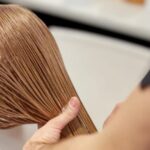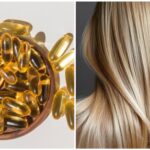does dandruff cause hair loss? Dandruff is a widespread condition that influences individuals worldwide. Dandruff is typically associated with classic symptoms of itching and scalp flaking and inevitably leaves individuals wondering whether dandruff may contribute to hair loss.
In this resource, we will investigate the relationship between dandruff and hair shedding, after exploring what causes dandruff, its overall contribution to scalp and hair health, and treatment and prevention options for these symptoms.
Dandruff Demystified: What Is It?
Dandruff is a scalp ailment consisting of white/or yellowish flakes of dead skin that slough off the scalp. Dandruff may arise from different conditions, the most common ones being:
Dry Skin: One of the most common causes of dandruff is dry skin; this is especially the case during cold weather when heating in your home can dry out your scalp.
Seborrheic Dermatitis: A type of dermatitis characterized by red, greasy lesions that are flaky and covered in white/yellow scale; this commonly occurs on the scalp, behind the ears, in the study area on the scalp, the eyebrows, cheeks, and around the nose.
Fungi (Malassezia): This is ya east that lives on the scalp. Although it lives on the scalp naturally, it’s possible for it to grow too much and cause irritation that leads to excessive shedding of skin.
Poor Hair Hygiene: Poor hair hygiene that leads to infrequently washing your hair can lead to grease, dirt, and dead skin not shedding, leading to dandruff.
Product Buildup: Many hair care products leave residue on the scalp, and this can lead to flakes and irritation of the scalp.
Diet and Lifestyle Factors: Deficiencies, stress, and hormones can also trigger or worsen dandruff.
Does Dandruff Contribute to Hair Loss?
Dandruff does not inherently cause hair loss, but it can be a contributing factor to certain problems that result in hair loss. Here are five possible ways;
1. Inflammation and irritation on the scalp
Dandruff can develop itchy spots and inflammation which creates excessive scratching or aggressive rubbing of the scalp. Frequent scratching can weaken the hair follicles which could cause damage to the hair, or cause hair to fall out.
2. Clogged hair follicles
The combination of the excess dandruff flakes and sebum (natural oil from the scalp) can clog hair follicles, which can restrict hair growth for a surprisingly long time. Dandruff also may contribute to conditions in which you may have thinner hair.
3. Weakening of the hair strands
Severe dandruff often called Seborrheic dermatitis results in increased oil and irritation that leads to the majority of hair roots becoming weaker which causes hair to fall out.
4. Fungal overgrowth (Malassezia)
An overgrowth of the Malassezia yeast becomes irritating to the skin and can result in excessive shedding. If not treated, this could lead to temporary hair loss due to excessive shedding.
5. Underlying health issues
Dandruff can also be a sign of another health issue, such as psoriasis or eczema, or due to hormonal changes, which can all lead to hair loss.
How to Address Dandruff and Stop Hair Shedding
If you’re experiencing dandruff along with hair shedding, treating the scalp issues that cause dandruff can bring your scalp health back to normal and reduce scalp hair shedding. Below are some treatment options that may work:
1. Use an Anti-Dandruff Shampoo
Use an anti-dandruff shampoo that includes:-
Zinc Pyrithione: Kills the fungus and bacteria that causes dandruff
Ketoconazole: A strong antifungal agent that treats severe dandruff and scalp infections.
Selenium Sulfide: Can reduce flaking and itching.
Salicylic Acid: Can assist in the removal of excess flakes and unclogging of hair follicles
Coal Tar: Can help reduce the excessive shedding of skin cells.
2. Keep your scalp clean
Regularly shampooing with a gentle, sulfate-free shampoo will reduce excessive oil and flakes while reducing buildup in the hair follicles.
3. Do not overwash.
While it’s important to keep your scalp clean, excessive washing can strip hair of natural oils leading to hair dryness and more flaking. Unless hair has excessively oily factors, wash hair 2-3 times per week
4. Take Care of Your Scalp By Moisturizing
Having a dry scalp can exacerbate existing dandruff, so keeping it moisturized with natural oils will help soothe any irritation, as well as help with the dryness and patchy flakes. Consider coconut oil, tea tree oil, or aloe vera to help keep the scalp moist.
5. Improve Your Diet
A well-rounded balanced diet full of vitamins and minerals will help with the health of your scalp. Concentrate on:
Omega-3 Fatty Acids– Found in fish, flaxseeds, and walnuts. Omega-3 fatty acids can help keep the scalp hydrated.
Zinc- Found in nuts, seeds, and whole grains. Zinc is a well-known mineral that plays an essential role in skin health.
Biotin- Found in eggs, nuts, and sweet potatoes. Biotin is essential for hair growth.
Vitamin B & D– Play a role in maintaining the health of hair follicles and other scalp health.
6. Stress Management:
Stress can trigger dandruff and additional shedding of hair. Practicing relaxation techniques such as meditation, yoga, and deep breathing techniques may help you manage stress levels.
7. Avoid Harsh Hair Products
Avoid using products that include alcohol, sulfates, or heavy silicones as part of the styling/finishing process. Products that strip hair and scalp of natural oils can lead to further irritation when the scalp is left unmoistened, and can even result in dandruff.
8. See a Dermatologist
If the over-the-counter products fail to eliminate your dandruff, seeing a dermatologist may help to identify the functional or structural cause of your scalp issues and recommend prescription treatment if necessary.
Summary
Dandruff doesn’t cause hair loss directly; however, if it’s left untreated, irritation, inflammation of the scalp, and blockage of the hair follicles can cause hair loss. A healthy scalp is complemented with healthy hair. Haircare, as well as adequate dietary and lifestyle changes, will help you get dandruff under control and healthier hair. See a dermatologist to discuss treatment options to address dandruff if it’s severe, or hair loss if it’s excessive.
FAQs
1. Is there a risk of a permanent loss of hair due to dandruff?
In most instances, it is unlikely that the hair loss that is sometimes experienced in association with dandruff will be permanent. The hair should regrow normally after the scalp is properly treated and new healthy hair begins to grow in.
2. How long should it usually take to treat dandruff?
Generally, mild dandruff can expect improvement in a few weeks for mild dandruff thanks to appropriate care, while more serious cases may take a longer duration of time to improve and require treatment.
3. I have dandruff, should I discontinue the use of hair oils?
Not necessarily. Lighter oils, such as tea tree oil or coconut oil, may be appropriate for reducing flaking while heavier oils may contribute to additional buildup. Moderation is appropriate in using the oils and when rinsing hair.
4. Can frequent changes in shampoo contribute to dandruff?
By changing your shampoo frequently, you can throw off the scalp’s natural balance. If you have found a shampoo that works for you, it is encouraged to stay consistent with your product to help maintain the health of your scalp.
5. Is dandruff infectious?
No, dandruff is not infectious but is due to factors that include skin type, fungal overgrowth dietary or lifestyle factors, not direct contact.












